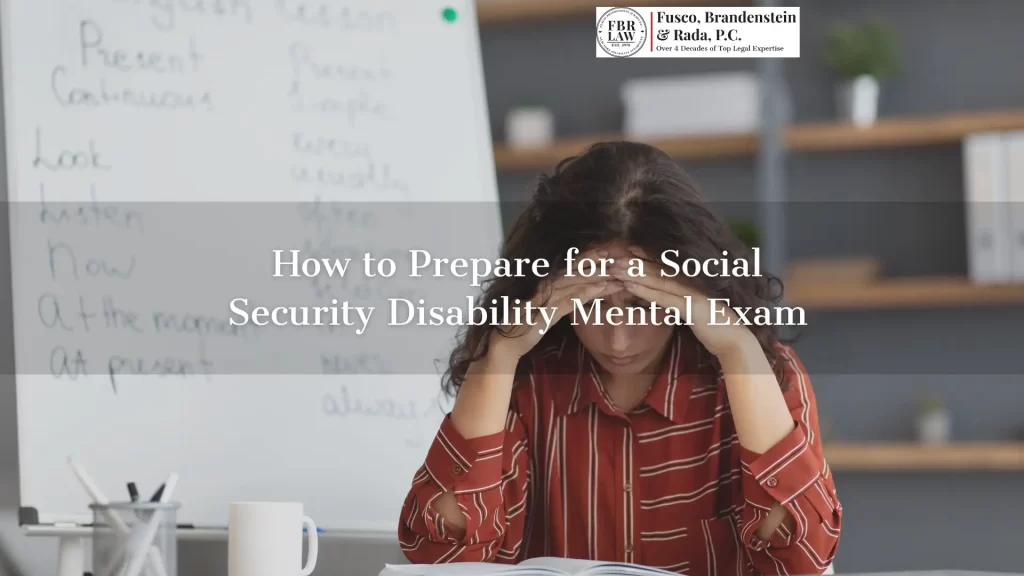
If you or someone close to you is living with a mental disorder, applying for Social Security Disability Insurance (SSDI) benefits might involve a comprehensive mental exam. Understanding what to expect at a Social Security Disability mental exam can reduce anxiety and set you up for success.
Understanding the Purpose of the Mental Exam
Psychological tests play an essential role in the Social Security Disability benefits application process. These exams are specifically designed to evaluate individuals claiming disability benefits due to mental health conditions. Each mental exam’s main purpose is to professionally assess the applicant’s mental health and work capacity objectively.
Qualifying Mental Disorders
The SSA has established a comprehensive set of criteria to evaluate mental disorders for disability benefits. These criteria are organized into 11 categories listed in the SSA’s Blue Book. The 11 categories include the following:
- Neurocognitive Disorders – Conditions such as dementia and Alzheimer’s that affect memory, attention, and learning abilities
- Schizophrenia Spectrum and Other Psychotic Disorders – Disorders like schizophrenia, schizoaffective disorder, and delusional disorder characterized by a loss of contact with reality
- Depressive, Bipolar, and Related Disorders – Mood disorders, such as major depression and bipolar disorder, which significantly impact an individual’s emotional state
- Intellectual Disorders – Intellectually disabling conditions involving significant limitations in cognitive functioning and adaptive behavior
- Anxiety and Obsessive-Compulsive Disorders – Conditions like generalized anxiety disorder, panic disorder, and obsessive-compulsive disorder (OCD), characterized by excessive worry, fear, or compulsive behaviors
- Somatic Symptoms and Related Disorders – Disorders like somatic symptom disorder and illness anxiety disorder with physical symptoms that cannot be attributed to general medical conditions
- Personality and Impulse-Control Disorders – Conditions like borderline or antisocial personality disorder, characterized by maladaptive patterns of behavior, cognition, and inner experience
- Autism Spectrum Disorders – Disorders involving persistent deficits in social communication and interaction, along with restricted, repetitive patterns of behaviors, interests, or activities
- Neurodevelopmental Disorders – Disorders like ADHD and learning disabilities, characterized by developmental deficits in personal, social, academic, or occupational functioning
- Eating Disorders – Conditions like anorexia nervosa, bulimia nervosa, and binge eating disorder, characterized by severe disturbances in eating behavior
- Trauma- and Stressor-Related Disorders – Conditions like post-traumatic stress disorder (PTSD) and acute stress disorder, which are related to experiencing or witnessing traumatic events
Types Of Psychological Tests
The SSA uses various mental exams to assess the mental conditions of Social Security Disability (SSDI) applicants. These tests aid in evaluating each person’s mental capacity, memory, and other aspects of their psychological functioning.
Psychological tests the SSA might consider in its determination process include the following:
- Intelligence Tests – These tests measure intellectual functioning, including problem-solving abilities, verbal comprehension, and working memory.
- Standardized Tests Of Adaptive Functioning – These assessments determine how well an individual can adapt and carry out everyday tasks and social responsibilities.
- Academic Achievement Tests – These tests evaluate an individual’s academic abilities in areas such as reading, writing, and mathematics.
- Neuropsychological Batteries – These comprehensive tests measure cognitive functioning and are particularly helpful in detecting brain dysfunction.
- Memory Tests – These specifically assess different types of memory abilities, including immediate recall, short-term memory, and long-term memory.
- Personality Measures – These assessments identify enduring patterns of perceiving, relating to, and thinking about the environment and oneself.
- Screening Tests – These tests serve as initial screenings to identify potential mental health issues that may necessitate further evaluation.
- Performance Validity Tests – These tests are for determining whether the test taker is providing maximum effort or true and accurate responses.
- Symptom Validity Tests – These are used to determine the authenticity of reported symptoms and to rule out exaggeration or malingering.
Preparing for a Social Security Disability Mental Exam
 Here are some practical steps you can take to prepare yourself for a mental exam:
Here are some practical steps you can take to prepare yourself for a mental exam:
- Consult a Lawyer – A lawyer can clarify the exam’s purpose, process, and potential mental tests, aiding your better preparation.
- Review Your Medical History – Take the time to review your own medical history. Your ability to accurately and thoroughly discuss your history with the examiner could be important.
- Document Your Symptoms – Keep a journal of your symptoms. This can be a helpful tool in communicating effectively about the mental health condition and how it impacts your daily life.
- Rest Well Before the Exam – Ensure you get a good night’s sleep before the exam. Being well-rested will help you to better focus and respond during the exam.
Speak with a Disability Lawyer Now
Applying for Social Security Disability benefits can feel overwhelming, especially when dealing with a mental exam. At Fusco, Brandenstein & Rada, P.C., we commit to ensuring a smooth process for you. To understand how we can assist you, call our team of legal experts now at 516-496-0400 or reach out to us online to take advantage of your free case review.
Related Reading:
